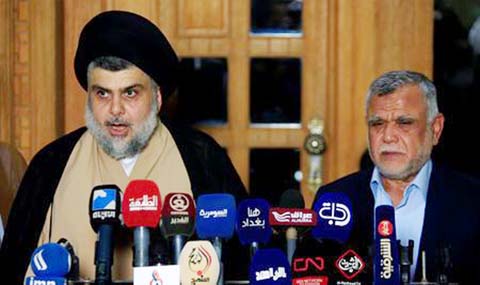
Reuters, Baghdad :
A growing rivalry between two powerful Shi’ite Muslim factions has paralyzed efforts to form a government in Iraq six months after an election aimed at steering the country toward recovery from years of war.
The two largest parliamentary groupings to emerge after the vote in May – one led by populist cleric Moqtada al-Sadr and the other by Iranian-backed militia leader Hadi al-Amiri – formed a tacit alliance in October when they picked a president and approved 14 out of 22 cabinet ministers.
But since then there has been stalemate, mainly over the empty interior ministry post dominated for years by allies of Amiri, who are backing the former head of a paramilitary force supported by Tehran. Sadr meanwhile says no one with a political affiliation should get the post. A vote in parliament to fill the vacant ministries in Prime Minister Adel Abdul Mahdi’s cabinet has been repeatedly put back.
Iraq’s return to deadlocked parliamentary politics, now involving Shi’ite factions rather than the Sunni-Shi’ite sectarianism that followed the 2003 U.S.-led invasion, prompted a plea last week from Iraq’s most senior Shi’ite cleric for politicians to work together.
That now looks all but impossible. As Grand Ayatollah Ali al-Sistani made his remarks, the two sides broke off talks, lawmakers said.
“We reached a dead end,” Hanin Qaddo, a member of the bloc led by Amiri, told Reuters on Friday.
“There’s no need for more delays, no use in talks,” MP Ahmed al-Kinani said. “We will go to parliament and vote for the rest of the cabinet.”
He said they would do this without agreement from Sadr’s supporters even though the parliamentary arithmetic is against them.
Sadr on Monday urged Abdul Mahdi to present the rest of his cabinet to parliament for approval as soon as possible, without disputed candidates. “You must not submit to what is going on behind the scenes,” Sadr told the prime minister.
Sadr, whose alliance won the most parliamentary seats in the election, has threatened to walk out of the political process and stage mass demonstrations as he has done in the past, notably when protesters stormed Baghdad’s fortified Green Zone in 2016.
“If Bina (Amiri’s bloc) ignores us then we will resort to all possible options including mobilizing the street,” said a member of Sadr’s alliance, who declined to give his name.

